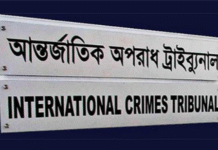The Supreme Court will deliver a verdict Tuesday on appeals filed against conviction and “inadequate sentencing” of war criminal and Jamaat leader Abdul Quader Mollah.
SC Registrar AKM Shamsul Islam told The Daily Star that the appeals will come up as item No 1 in tomorrow’s list of the apex court for verdict.
The government has beefed up the security at the court premises to avoid any untoward incident over pronouncement of the verdict, said the registrar.
On July 23, the Appellate Division of the Supreme Court (SC) kept the appeals waiting for verdict.
International Crimes Tribunal-2 on February 5 sentenced Mollah to life imprisonment on two charges and different jail terms on the other three proved charges.
In total, six charges were brought in the case filed against the Jamaat-e-Islami assistant secretary general for committing crimes against humanity during the Liberation War in 1971.
The state on March 3 appealed to the SC against Mollah’s sentencing by Tribunal-2, claiming that the punishment was inadequate, and sought the death penalty.
The defence appealed a day later seeking acquittal on all charges.
Victims and justice seekers were unhappy over the “inadequate” sentencing of Mollah. They demanded highest punishment, death penalty, for the convicted Jamaat leader.
The parliament amended the International Crimes (Tribunals) Act, 1973, two weeks after Mollah’s verdict was delivered, to ensure the right of the state to appeal on behalf of war-crimes victims of 1971, if it felt the punishment was inadequate.
Mollah’s defence counsels and friends criticised the amendment.
Attorney General Mahbubey Alam in his closing arguments on the appeals on July 23 prayed to the apex court to accept the state’s appeal and award death penalty to Quader Mollah for his crimes against humanity in 1971.
However, during the hearing on the much-talked-about appeals, the state and defence counsels as well as some top jurists of Bangladesh reached a consensus that the apex court could increase or decrease the sentence given by any court to a convict, even without any appeal against inadequate sentencing.
Mollah’s counsel Abdur Razzaq during his closing arguments on July 22 also gave a similar view.
The seven amici curiae (friends of court), appointed by the SC for the appeals, also gave the same opinion.
Razzaq in his closing arguments also told the court that the government’s appeal seeking death penalty for Quader Mollah was not acceptable under the amended International Crimes (Tribunals) Act, 1973, since the amendment was passed after Tribunal-2 had convicted his client of war crimes.
The prosecution had placed poor evidence and documents in the case against Quader Mollah, and therefore, he could not be punished in this case, he argued.
Source: The Daily Star










